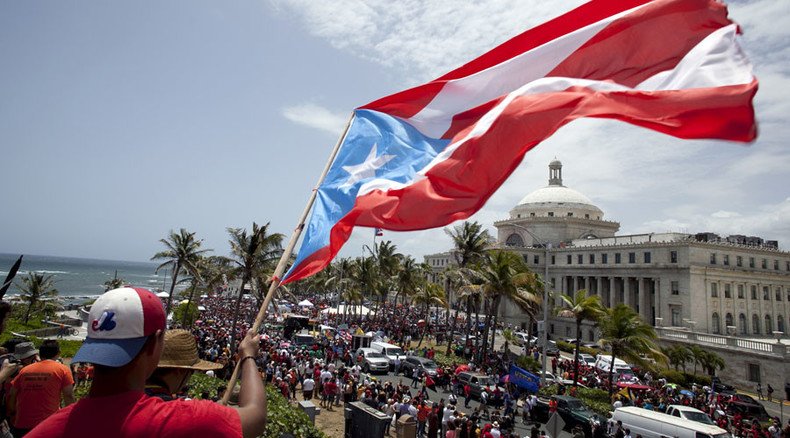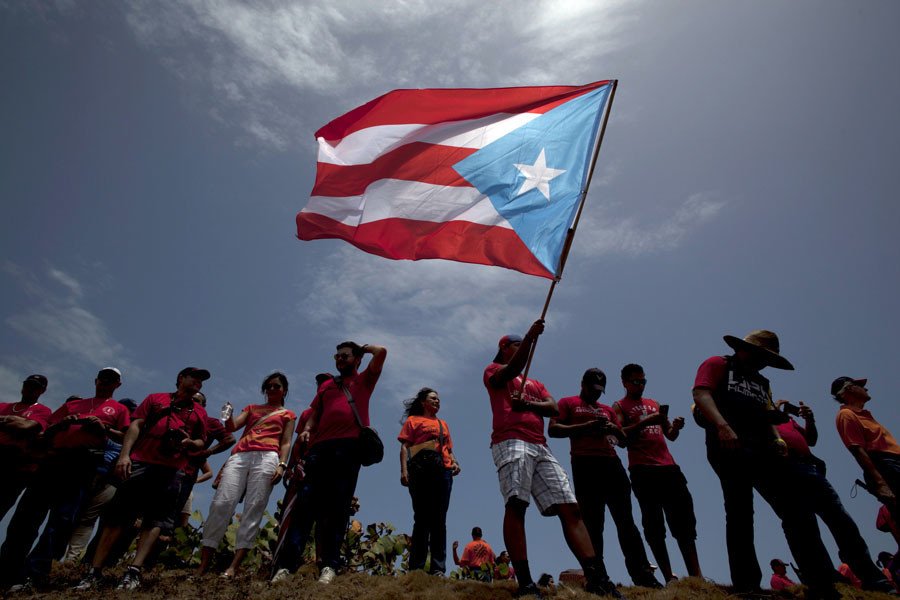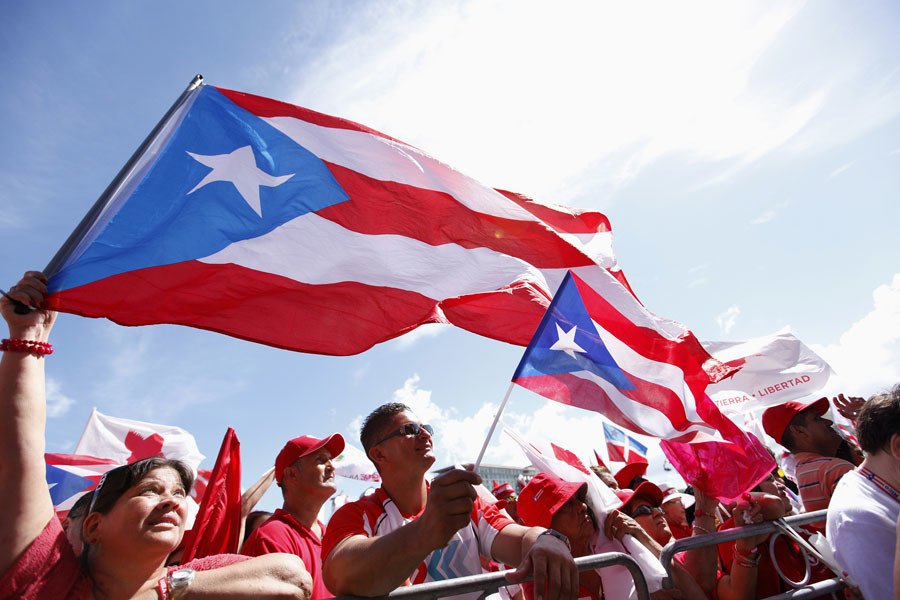‘Vulture funds hover around Puerto Rico seeking to make a killing’

The hedge funds that hold a large part of Puerto Rico’s distressed debt are willing to savagely destroy the economy and society to get paid, and that’s a serious threat to the millions of people who live there, says Richard Wolff, economist and author of 'Democracy at Work: A Cure for Capitalism'.
Puerto Rico has been already dubbed the 'Greece of the Caribbean' due to its mounting debt. The crisis has been taking its toll on the most vulnerable with billionaire lenders now demanding schools close in order to repay loans.
RT: What are your thoughts about the situation in Puerto Rico?
Richard Wolff: Puerto Rico has been a semi-colony of the US for a very long time and what that has meant is that it has remained a very poor part of the US. It’s not a state like the other 50 states, it’s considered a commonwealth territory of the US and it enjoys certain benefits in terms of the US economy but those have not prevented Puerto Rico from being poorer than most US states by quite a bit, suffering higher rates of unemployment, higher levels of poverty and so on.
READ MORE: Vulture funds demand brutal austerity measures from bankrupt Puerto Rico
This has led to two major economic problems. One, a huge number of the citizens of Puerto Rico have for many decades now left the island and moved to the US because they can get better jobs, they have better chances of earning a decent income and so on. The island has had its problems deepened by the loss of so many of its citizens and especially young people early in their life time, after they have been educated leaving for the main land.
The second big problem has been that the efforts so far to try to help Puerto Rico’s economic underdevelopment have been - and I’ll being as polite here as I know how - unsuccessful and undemocratic to say the least. To give you just one idea, special tax arrangements were made for corporations from the US that would move production to Puerto Rico. Very famous over recent decades was the example of the pharmaceutical industry. Drug makers who moved their production, their factories to Puerto Rico, but never raised the wages there anywhere near enough to change the economy and as soon as their tax avoidance arrangements expired, those companies left, went elsewhere in the world to pay even cheaper wages than what they paid in Puerto Rico.
So over the years the Puerto Rican government was unable to raise enough money from its own people - both its wealthy minority and its quite poor majority - to be able to provide decent education and so on. With the end result that the politicians there borrowed the money; they borrowed from banks in New York by and large and they borrowed more than they should have, the banks lent them more than they should have. We now come to the situation where the debts of Puerto Rico have accumulated $72 billion and a few weeks ago the governor of Puerto Rico announced that there is simply no way for this poor corner of the US economy to service, to pay that debt… Puerto Rico is to the US rather similar to what Greece is to Europe.

RT: Could you draw parallels between the 2008 crisis and the situation in Puerto Rico, considering a big part of its debt is held by hedge funds? Is it fair to say then that hedge funds hold risks for the broader economy?
RW: When Puerto Rico borrowed money over the years they borrowed money from banks and they issued bonds of all kinds, securities that are backed by the ability of Puerto Rico to raise money by taxing its people, by running certain kinds of public businesses and so on. When it looked as though Puerto Rico was simply no longer able to pay, many of the banks and others who have lent Puerto Rico money by purchasing its bonds sold the bonds; they became nervous that the Puerto Rican government couldn’t and wouldn’t pay and so they were willing to sell – to give you an example - a thousand-dollar bond. That means that you’ve lent the Puerto Rican government a thousand dollars, they give you a bond which is like an IOU, a promise that the Puerto Rican government will pay whoever owns that bond the thousand dollars.
But if you are afraid that Puerto Rico will not pay what you begin to do is sell, try to find someone else who will give you $800 for the bond or 700. You are willing to take that loss especially because you’ve had nice interest payments for years on that bond. But you are willing to take a loss now because you want a certainty of this $700 or $800 rather than risking the whole $1,000 loss.
Here’s where hedge funds come in. The hedge funds come in and they make a business by buying what’s called distressed debt. They buy those bonds from the individuals, the banks, the corporations who hold them, who make the original loans to Puerto Rico, they buy them at a big discount. To give you an example, a hedge fund might buy a $1,000 debt of Puerto Rico, but only pay $400, $500 or even less for it. Their hope is that Puerto Rico will either get help from Washington or find some other way to raise the money to pay off the $1,000 debt because then the hedge fund has made a killing: it has purchased a $1,000 bond for let’s say $500 and then they get paid off by the Puerto Rican government for the whole amount, they hope a thousand, they double their money and this could happen in a very short time.
But of course all of this depends on the Puerto Rican government being able somehow to do what the governor himself said a few weeks ago: it can’t do that.
How do the vulture funds then make sure to get their money? These hedge funds by the way that are called vulture funds because they hover around economies like Greece and Puerto Rico that are a little bit dead or in danger of dying economically. So they are a little bit like the birds that go after dead animals in the desert hence the name vulture funds. Here’s what they do: they put either huge pressure on the US government in Washington to ‘save’ Puerto Rico. They of course don’t care one bit about Puerto Rico. What they mean is that Washington should absorb, accept, take over the debts of Puerto Rico and pay those vulture funds their money.
If that doesn’t work and President Obama has indicated he is not interested in doing this and the Republicans in the Congress for sure would not go along with this, then the only thing left for the vulture funds to do is to try to put maximum public pressure on Puerto Rico to find the money somehow. And recently they have explained what they mean by ‘somehow’. One: If the Puerto Rican government still owns any part of the land in Puerto Rico [it could sell it to companies] and use the money to pay off their debts. Number two: Puerto Rico should lay off public school teachers and close schools in many areas, forcing students into larger class rooms and use the money that they don’t need to pay teachers - because they’ve fired them and that they don’t need to run schools because they’ve closed them - and use the money instead, you guessed it, to pay off their debts to the vulture funds. And what everybody understands is that the vulture funds, the hedge funds, looking to make a killing on their investments in distressed Puerto Rican bonds are willing to savagely destroy the economy and society of Puerto Rico to get paid and that’s a serious threat right now to the millions of people who live there.

‘Hedge funds holding Puerto Rico to ransom, education cuts totally unjustified’
Economist Jack Rasmus suggests that the proposal made by the Centennial Latin America Group to Puerto Rico about cutting education costs is totally unjustified.
RT: How would you describe the situation in Puerto Rico? Could we compare it with 2008 as a big part of its debt is held by hedge funds?
Jack Rasmus: Puerto Rico looks very much like the Detroit situation recently when Detroit went bankrupt and the hedge funds didn’t want to take a haircut, as they say. And negotiations went on between government entities and the hedge funds before they came to a settlement. You’ve got to understand hedge funds shuttle banks played a big role in the 2008 crash, they got these cities, and states, and public entities hooked on interest rates swaps and other esoteric financial securities, and they lost a lot of money: the cities, states, school districts, and so forth. The same thing happened to Puerto Rico.
Following the 2008 crash Puerto Rico did not recover. Puerto Rico has been in pretty much of a depression. Ever since, its GDP dropped every year. So what Puerto Rico has done since 2008 has been to refinance a lot of that bad debt. But because its economy was so bad, it turned out to be a lot of junk debt, and you get another group of hedge funds coming in – distressed debt buyers who make big interest rates by rolling over refinancing the government debt. And that is what happened to Puerto Rico. And it’s getting to a point where Puerto Rico no longer has the cash flow in order to make payments on that debt. So the Puerto Rican government says: “Look, we got to restructure this.” And of course the hedge funds don’t want to do that, and they are saying: “Well, you know, cut education and raise your taxes,” and all the other things that hedge funds tend to do in these kinds of crises.
RT: Hedge funds are calling on Puerto Rico's government to drastically cut education spending and slash teachers. What do you think of this proposal?
RW: If you look at the proposal made by the Centennial Latin America Group… Jose Fajgenbaum and Claudio Loser who run this group often do these reports for Latin America on behalf of the IMF at arm's length distance to see what the response will be. They are proposing typical IMF proposals, which is to raise taxes and cut government spending and reduce your deficit in order to continue to be able to pay the hedge funds. They are proposing these big cuts in education, but they are totally unjustified. The average cost per student in Puerto Rico is twenty percent less than the average cost in the US in school districts. The total cost of education for Puerto Rico today in 2015 is about the same as it was in 2009. So this whole thing about cutting educations costs in University of Puerto Rico and so forth is totally unjustified but it’s part of what they do, hedge funds in this kind of debt situations. They did in Argentine, they are doing it in Greece, they did in Detroit. It’s the same old story over and over again – make the people pay in order to continue paying ever higher interest charges and debt borrowed from hedge funds.
The statements, views and opinions expressed in this column are solely those of the author and do not necessarily represent those of RT.
The statements, views and opinions expressed in this column are solely those of the author and do not necessarily represent those of RT.












